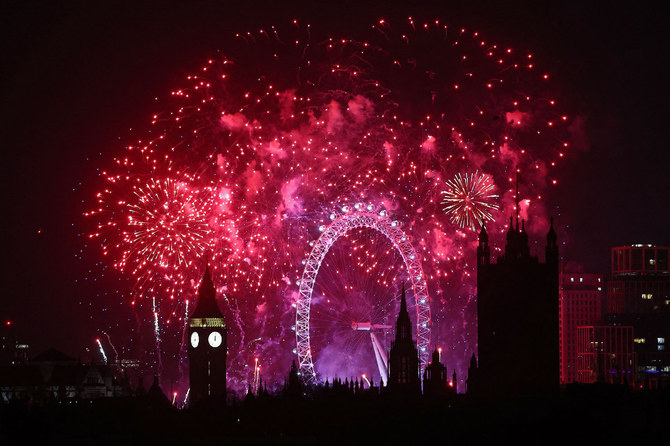New Year’s Day arrived to cheers from tens of thousands of beaming people in New York’s Times Square who were showered with confetti and hugs and kisses after watching the descent of the colorful ball marking the birth of 2024 with hope for some, even as the world’s ongoing conflicts subdued celebrations and raised security concerns across the globe.

Fireworks explode over the Sydney Harbour Bridge and Sydney Opera House (L) during New Year's Eve celebrations in Australia on January 1, 2024. (AFP)
“It’s beautiful,” Corin Christian of Charlotte, North Carolina, said of the scene seconds past midnight as Frank Sinatra’s “New York, New York” blared from speakers in the square and many in the crowd held cell phones in the air, trying to capture the spectacle.
“It’s going very well so far,” said Jacob Eriksson of Salt Lake City, Utah, with the earliest assessment of the New Year.
The march of midnight from time zone to time zone brought 2024 first to places like Australia, where more than 1 million people watched a pyrotechnic display centered around Sydney’s famous Opera House and harbor bridge — a number of spectators equivalent to 1 in 5 of the city’s residents. It would be another 16 hours before New York finished 2023.
There were snapshots of joy from country to country as the new year was welcomed with optimism that its days will bring more joy than sorrow.
Before midnight arrived in Times Square, December Lee, 26, and Shadayah Lawrence, 25, of Columbus, Ohio, said their New York visit highlighted four years of traveling the globe.
“It is a good way to bring in the new year,” Lee said.
Also in Times Square, Tyrell Jacobs, 27, and Sarah Crayton, 26, arrived from New Orleans 15 hours before midnight and got engaged in streets packed with tens of thousands of people counting first the hours and then the minutes until midnight.
“It’s definitely a must-see,” Crayton said of the colorful cast of strangers nearby in tall hats and blowing noisemakers even before the ball dropped. “At least go once, you know, just to experience the magic.”
A small army of thousands of police officers worked to keep New York City safe, just as heightened security had done in the cities midnight hit first. New York has seen near-daily protests sparked by the Israel-Hamas war.
Some 90,000 police and security officers were deployed around France including along Champs-Elysees Avenue, where large crowds took in a multidimensional light show projected onto the Arc de Triomphe showcasing the history of Paris and sports on the menu for next year’s Summer Olympics in the city.
While New Year’s Eve concerts were plentiful across America on Sunday night, CNN news personality Anderson Cooper followed a tribute to entertainers who died in 2023 by acknowledging the network’s jovial New Year’s Eve program with co-host Andy Cohen might also be a sad occasion for some viewers.
“There’s a lot of people who feel like they can’t celebrate,” he said in the final minutes of a year that claimed the lives of Tina Turner, Tony Bennett, Harry Belafonte, Sinéad O’Connor, Jimmy Buffett, Burt Bacharach and David Crosby, among others.

Revellers gather in Times Square during the celebrations of the New Year's Eve in New York City on December 31, 2023. (REUTERS)
Fireworks light up the night
Stunning fireworks displays bloomed at iconic locations like the Acropolis in Athens, Greece; reflected in the sleek glass walls of the world’s tallest building, the Burj Khalifa, in Dubai, the United Arab Emirates; and accompanied a collective cheer filling the air in Nairobi, Kenya.
China celebrated relatively quietly, with most major cities banning fireworks over safety and pollution concerns. Still, people gathered and performers danced in colorful costumes in Beijing, while a crowd released wish balloons in Chongqing. During his New Year address, President Xi Jinping said the country would focus on building momentum for economic recovery in 2024 and pledged China would “surely be reunified” with Taiwan.
In Taipei, Taiwan’s capital, the mood was upbeat as revelers gathered for a fireworks show at the bamboo-shaped Taipei 101 skyscraper and at concerts and other events citywide.

Fireworks explode over the city during New Year's celebrations in Nairobi, Kenya, on Dec. 31, 2023. (AP)
In India, thousands of revelers from the financial hub of Mumbai watched the sun set over the Arabian Sea. Fireworks in New Delhi raised concerns that the capital — already infamous for its poor air quality — would be blanketed by a toxic haze on the first morning of the new year.
Across Japan, people gathered at temples such as the Tsukiji Temple in Tokyo, where visitors were given free hot milk and corn soup as they stood in line to strike a massive bell.
About 2 million people gathered at Rio de Janeiro’s Copacabana beach under light drizzle to watch 12 minutes of fireworks in one of the world’s most popular locations for New Year’s Eve.

Taiwanese citizens celebrate the arrival of 2024 with fireworks at Taipei 101 Tower in Taipei on January 1, 2024. (REUTERS)
Pope highlights the human cost of war
At the Vatican, Pope Francis recalled 2023 as a year marked by wartime suffering. During his traditional Sunday blessing from a window overlooking St. Peter’s Square, he offered prayers for “the tormented Ukrainian people and the Palestinian and Israeli populations, the Sudanese people and many others.”
“At the end of the year, we will have the courage to ask ourselves how many human lives have been shattered by armed conflict, how many dead and how much destruction, how much suffering, how much poverty,” the pontiff said.
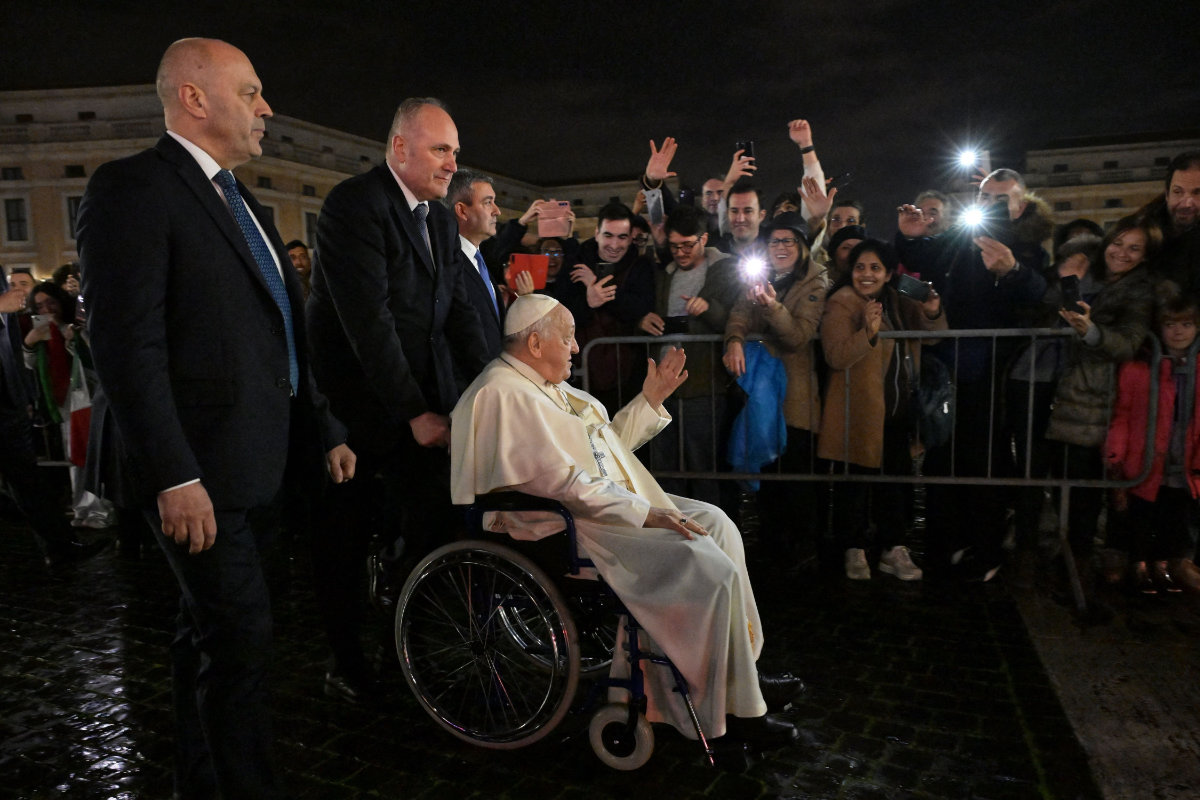
Pope Francis waves to onlookers from his wheelchair at Saint Peter Square in The Vatican on December 31, 2023. (AFP)
Gaza and Ukraine wars grind on
In Russia, the country’s military actions in Ukraine overshadowed end-of-year celebrations, with the usual fireworks and concert on Moscow’s Red Square canceled, as they were last year. Even without the festivities, people gathered in the square, and some cheered and pointed their phones at a clock counting down the year’s final seconds.

People gather near Red Square in Moscow (left frame) and in front of the St. Sophia Cathedral in Kyiv (right) on New Year's eve, Dec. 31, 2023, amid the Russian invasion of Ukraine. AP/Reuters)
After shelling in the Russian border city of Belgorod Saturday killed 24 people, some local authorities across the country also canceled their firework displays, including in Vladivostok. Millions were expected to tune in to President Vladimir Putin’s New Year’s prerecorded address, in which he said no force could divide Russians and stop the country’s development.
Israeli strikes in the Gaza Strip killed at least 35 people Sunday, hospital officials said, as fighting raged across the tiny enclave a day after Israeli Prime Minister Benjamin Netanyahu, resisting international calls for a cease-fire, said the war will continue for “many more months.”
Skyscrapers in Tel Aviv were lit up in yellow to call for the release of hostages held by Palestinian militants in Gaza for more than 80 days.
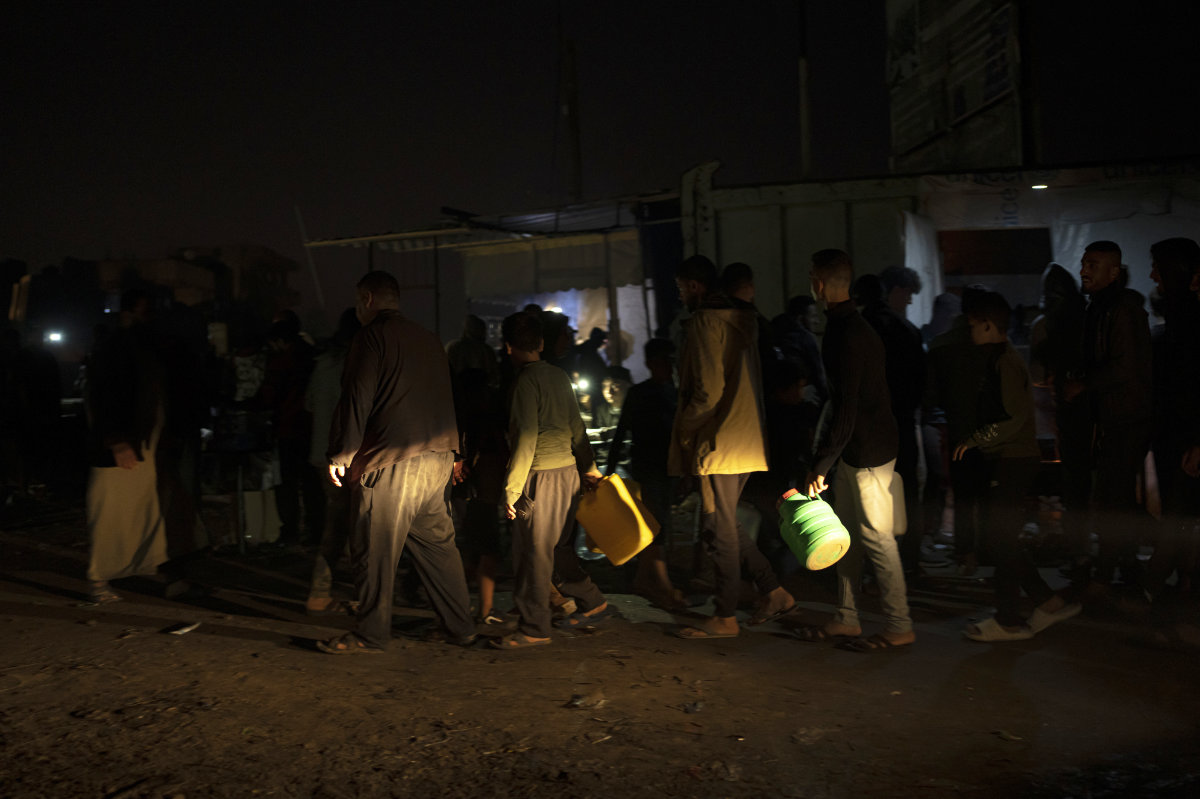
As most of the world joined the New Year's Eve revelry, Palestinians displaced by the Israeli bombardment of the Gaza Strip line up for water at a makeshift tent camp in the Muwasi area on Dec. 31, 2023. (AP)
“While you are counting down until the new year, our time and our lives stopped,” said Moran Betzer Tayar, the aunt of Yagev Buchshtab, a 34-year-old hostage.
In the Gaza Strip, displaced Palestinians huddled around fires in a makeshift refugee camp.
“From the intensity of the pain we live, we do not feel that there is a new year,” said Kamal Al-Zeinaty, who has lost multiple family members in the conflict. “All the days are the same.”
In Iraq, a Christmas tree was decorated with Palestinian flags and symbolic bodies in funeral shrouds, placed beside a liberty monument in central Baghdad. Many Christians in Iraq have canceled this year’s festivities in solidarity with Gaza, and have chosen to limit their celebrations to prayers and rituals.
“We hope that the new year, 2024, will be a year of goodness, prosperity and joy,” said Ahmed Ali, a Baghdad resident.
In Muslim-majority Pakistan, the government banned all New Year’s Eve celebrations in solidarity with the Palestinians.

Iraqis gather to celebrate the New Year around a Christmas tree in Baghdad, Iraq, Sunday, Dec. 31, 2023. (AP)
Global tensions spur security vigilance
New York Mayor Eric Adams said there were “no specific threats” to his city’s annual bash. Nevertheless, police said they expanded the security perimeter around the party, creating a “buffer zone” to allow them to head off potential demonstrations. On New Year’s Eve 2022, a machete-wielding man attacked three police officers a few blocks from Times Square.
The Las Vegas Strip was closed to vehicle traffic and there was a heavy law enforcement presence with armed officers lining the Strip as thousands of revelers gathered and street musicians played. The city of Las Vegas said more than 400,000 people were expected at the celebration.
German authorities said they detained three more people in connection with a reported threat of a New Year’s Eve attack by Islamic extremists on the world-famous Cologne Cathedral.
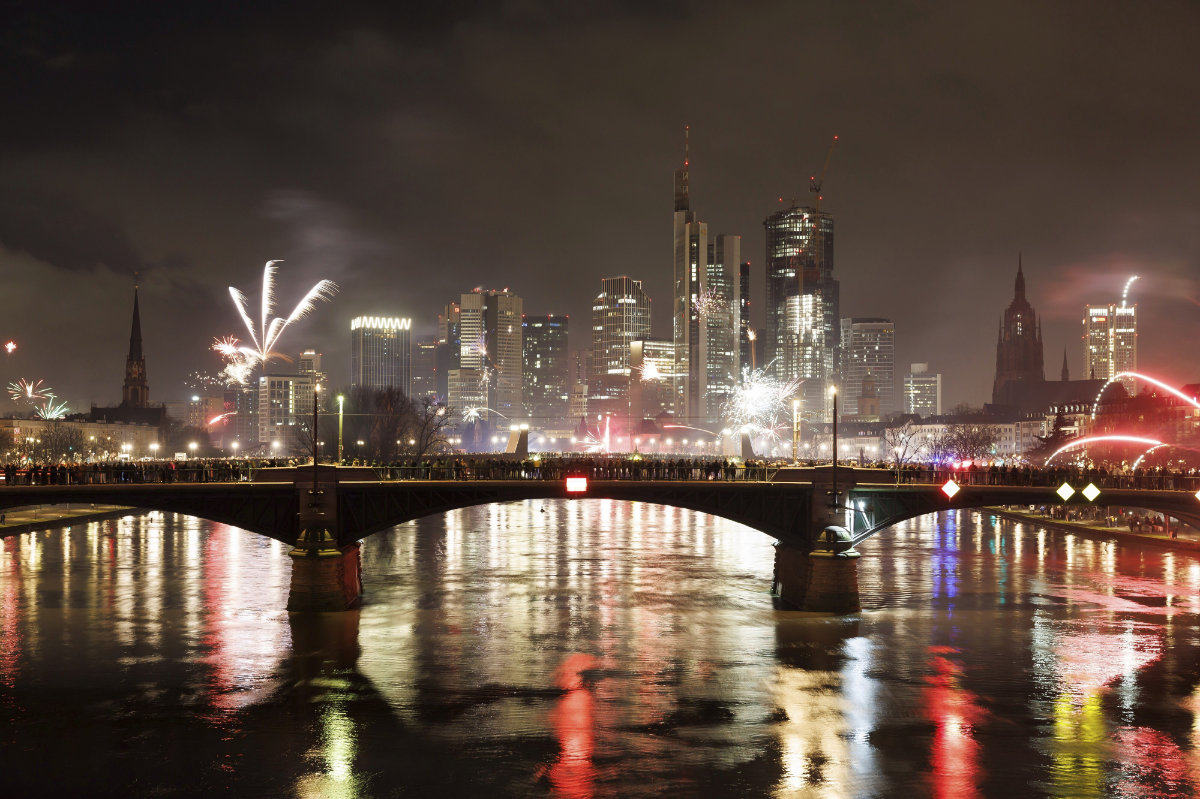
Revelers watch as fireworks explode in the sky over the River Main in Frankfurt, Germany, on Sunday, Dec. 31, 2023. (dpa via AP)
In Berlin, some 4,500 police officers worked to keep order and avoid riots like those seen a year ago. They also banned a pro-Palestinian protest in the Neukoelln neighborhood of the German capital, which has seen several pro-Palestinian riots.
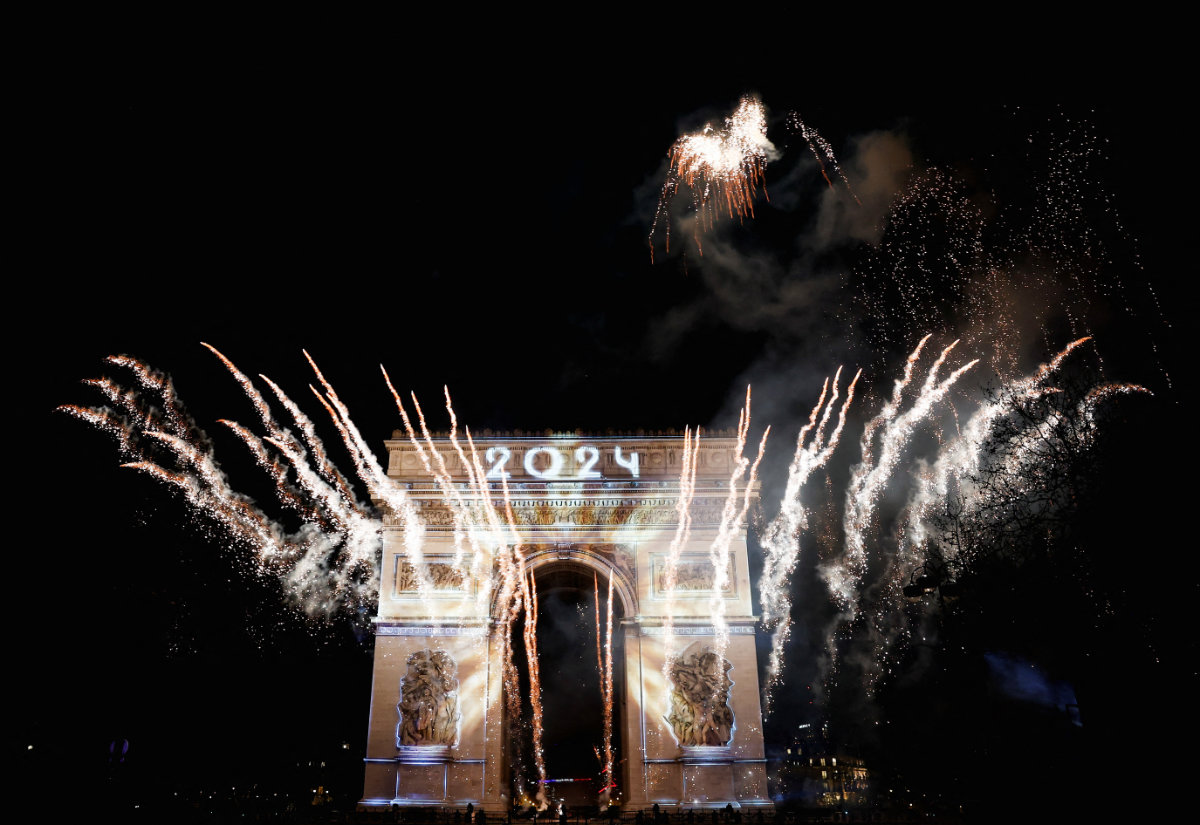
Fireworks illuminate the sky over the Arc de Triomphe during the New Year's celebrations on the Champs Elysees avenue in Paris, France, on January 1, 2024. (REUTERS)




